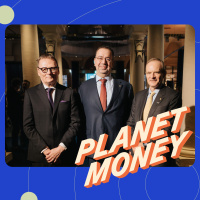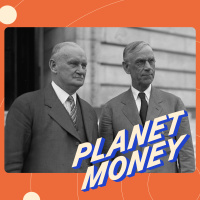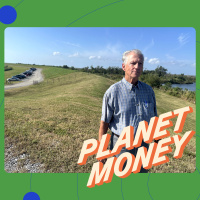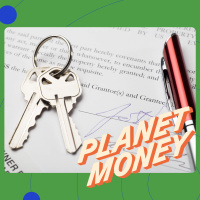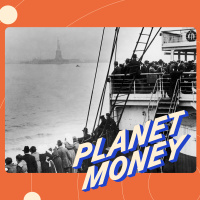Informações:
Sinopse
The economy, explained, with stories and surprises. Imagine you could call up a friend and say, "Meet me at the bar and tell me what's going on with the economy." Now imagine that's actually a fun evening. That's what we're going for at Planet Money. People seem to like it.
Episódios
-
A Nobel prize for explaining why there's global inequality
14/12/2024 Duração: 28minWhy do some nations fail and others succeed?In the late 1990s and early 2000s, three economists formed a partnership that would revolutionize how economists think about global inequality. Their work centered on a powerful — and almost radically obvious — idea: that the economic fate of nations is determined by how societies organize themselves. In other words, the economists shined a spotlight on the power of institutions, the systems, rules, and structures that shape society.We spoke with two of the Nobel-winning economists about their research on why some countries are rich and others are poor, why it took so long for economics to recognize the power of institutions, and what the heck those even are.This episode was hosted by Jeff Guo and Greg Rosalsky. It was produced by Willa Rubin with help from James Sneed. It was edited by Martina Castro and fact-checked by Sierra Juarez. Engineering by Gilly Moon with help from James Willetts. Alex Goldmark is Planet Money's executive producer.Help support Planet Mone
-
Worst. Tariffs. Ever. (update)
11/12/2024 Duração: 26minThe Smoot Hawley Tariffs were a debacle that helped plunge America into the Great Depression. What can we learn from them?Today on the show, we tell the nearly 100-year-old story of Smoot and Hawley, that explains why Congress decided to delegate tariff power to the executive branch in the first place. It's a story that weaves in wool, humble buckwheat, tiny little goldfish, and even Ferris Bueller... Anyone? Anyone?It's also what set the stage for the Trump tariffs. President-elect Donald Trump enacted a heap of import taxes in his first term, in particular on goods from China. President Biden's administration largely kept those tariffs in place, and levied new tariffs as well, on electric vehicles and solar panels.And now, as Trump's second presidency is on the horizon, he has promised even more tariffs on Mexico, Canada, China, and even on all imports across the board.And now, as Trump's second presidency is on the horizon, he has promised even more tariffs on Mexico, Canada, China, and even on all imports
-
There Will Be Flood
06/12/2024 Duração: 31minWindell Curole spent decades working to protect his community in southern Louisiana from the destructive flooding caused by hurricanes. His local office in South Lafourche partnered with the federal government's Army Corps of Engineers to build a massive ring of earthen mounds – also known as levees – to keep the floodwaters at bay.But after Hurricane Katrina called into question the integrity of those levees, Windell decided to take a gamble that put him at odds with his partners in the Army Corps. He decided that the best thing he could do to protect his community was to go rogue and build his levees as tall as possible as quickly as possible, without federal permission.On today's show, what the story of Windell's levee can teach us about how the federal government calculates and manages the risk of natural disasters, and how those calculations can look a lot different to the people staring straight into the eye of the storm.This episode was hosted by Alexi Horowitz-Ghazi and Mary Childs. It was produced by
-
George Soros vs. the Bank of England
04/12/2024 Duração: 30minAs people learn more about Donald Trump's pick for Treasury Secretary, Scott Bessent, one story comes up over and over: a legendary trade that he played a small part in while he worked at George Soros' hedge fund in the 1990s. In 1992, Soros' fund set its sights on the British pound, betting that some time in the fall of that year, the pound would plummet in value. Opposing them in this trade was the Bank of England, which was determined to keep its currency stable. The financial battle that followed was intense and proved to be a watershed moment in the balance of power between markets and governments.On today's show, we speak to Robert Johnson, a former managing director at Soros' fund, for a blow-by-blow account of those fateful days in 1992. This episode was hosted by Keith Romer and Alex Goldmark. It was produced by Willa Rubin and edited by Martina Castro. It was fact-checked by Sierra Juarez and engineered by Cena Loffredo. Alex Goldmark is Planet Money's executive producer. Help support Planet Money a
-
How useful, really, are the steps you can take after a data breach?
02/12/2024 Duração: 20minThe dreaded data breach notification... It tells you your personal data's been compromised and suggests steps you can take to minimize the potential harm. On today's episode, Kenny Malone pulls out a data breach letter he received and goes over what it recommends with Amanda Aronczyk. Amanda recently did a show about the legal and illegal markets for data and tells us how useful these steps actually are. It's news you can use to protect yourself, whether or not you've been part of a data breach.This normally would be a bonus episode just for Planet Money+ listeners. Today, during this season of giving, we're sharing it with everyone! To hear more episodes like this sponsor-free and support NPR, sign up for Planet Money+ at plus.npr.org. Related links:Data Breach Response: A Guide for Business (FTC)Have you been affected by a data breach? (FTC)Your Technology Is Tracking You. Take These Steps For Better Online Privacy (Life Kit)What happens after you get scammed? Can you get your money back? (Planet Money)Fire
-
Why you bought your couch
27/11/2024 Duração: 26minYou probably own a chair or a table or a sofa. And you probably think you know why you bought it. Because it was comfy. Or blue. Or the right price. But what if the style, the color, the cost, maybe even whether you would like it, were choices made for you years before you even thought about buying that piece of furniture.Today on the show: The city that makes or breaks the furniture world. We travel to High Point, North Carolina and meet the people who make the bets – on whether or not you'll want that comfy blue couch.This episode was hosted by Amanda Aronczyk and Erika Beras. It was produced by James Sneed with help from Willa Rubin. It was edited by Jess Jiang, fact-checked by Sierra Juarez, and engineered by Cena Loffredo. Alex Goldmark is Planet Money's executive producer.Help support Planet Money and hear our bonus episodes by subscribing to Planet Money+ in Apple Podcasts or at plus.npr.org/planetmoney.Learn more about sponsor message choices: podcastchoices.com/adchoicesNPR Privacy Policy
-
Title Pirates
23/11/2024 Duração: 25minA couple years ago, Gina Leto, a real estate developer, bought a property with her business partner. The process went like it usually did: Lots of paperwork; a virtual closing. Pretty cut-and-dry. Gina and her partner started building a house on the property.But $800,000 into the construction process, Gina got a troubling call from her lawyer. There was something wrong. At first, Gina thought the house had burned down. It turned out that the situation was... maybe worse.On today's show: Buying land seems pretty secure, right? There's so much paperwork and verification along the way. But a messy system of how titles are sold, transferred and documented makes a perfect entry point for a new kind of criminal: Title Pirates.Today's episode was hosted by Erika Beras and Jeff Guo. It was produced by Sam Yellowhorse Kesler. It was edited by Liza Yeager. Fact-checking by Sarah McClure. Engineering by Valentina Rodríguez Sánchez. Planet Money's executive producer is Alex Goldmark.Help support Planet Money and hear our
-
The long view of economics and immigration (Two Indicators)
20/11/2024 Duração: 15minMass deportations. What would actually happen—economically—if the President-elect follows through on promises to deport millions of people from America.We don't have to guess.Today we have two stories from Planet Money's daily podcast, The Indicator. First, the story from another time the US cracked down on immigration with the expressed intent of helping the economy. We look at how that worked out. And then we distill 20 years of research on immigrants and economic growth. What does immigration do for an economy? What types of immigration help? And who benefits?Our most recent newsletter goes into more depth on some of this. Part one of two here. Subscribe to our newsletter here.This episode is hosted by Adrian Ma, Darian Woods, and Wailin Wong. These episodes of The Indicator were originally produced by Cooper Katz McKim and Julia Ritchey, and engineered by Kwesi Lee and Maggie Luthar. They were fact-checked by Angel Carreras and Sierra Juarez. Kate Concannon is The Indicator's Editor.Help support Planet M
-
The great German land lottery
15/11/2024 Duração: 28minEvery ten years, a group of German farmers gather in the communal farm fields of the Osing for the Osingverlosung, a ritual dating back centuries. Osing refers to the area. And verlosung means "lottery," as in a land lottery. All of the land in this communal land is randomly reassigned to farmers who commit to farming it for the next decade.Hundreds of years ago, a community in Germany came up with their own, unique solution for how to best allocate scarce resources. For this community, the lottery is a way to try and make the system of land allotment more fair and avoid conflict.Today on the show, we go to the lottery and follow along as every farmer has a shot at getting the perfect piece of land — or the absolute worst piece of land! And we see what we can learn from this living, medieval tradition that tries to balance fairness and efficiency.This episode was hosted by Erika Beras and Emma Peaslee. It was produced by Emma Peaslee. It was edited by Jess Jiang. Reporting help from Sofia Shchukina. It was fa
-
The strange way the world's fastest microchips are made
13/11/2024 Duração: 26minThis is the story behind one of the most valuable — and perhaps, most improbable — technologies humanity has ever created. It's a breakthrough called extreme ultraviolet lithography, and it's how the most advanced microchips in the world are made. The kind of chips powering the latest AI models. The kind of chips that the U.S. is desperately trying to keep out of the hands of China.For years, few thought this technology was even possible. It still sounds like science fiction: A laser strong enough to blast holes in a bank vault hits a droplet of molten tin. The droplet explodes into a burst of extreme ultraviolet light. That precious light is funneled onto a wafer of silicon, where it etches circuits as fine as a strand of DNA. Only one company in the world that can make these advanced microchip etching machines: a Dutch firm called ASML.Today on the show, how this breakthrough in advanced chipmaking happened — and how it almost didn't. How the long-shot idea was incubated in U.S. nuclear weapons laboratories
-
What markets bet President Trump will do
09/11/2024 Duração: 26minOn the day after the election, Wall Street responded in a dramatic way. Some stocks went way up, others went way down. By reading those signals — by breaking down what people were buying and what they were selling — you can learn a lot about where the economy might be headed. Or at least, where people are willing to bet the economy is headed.On today's show, we decode what Wall Street thinks about the next Trump presidency — what it means for different parts of the economy, and what it means for everyone. Does the wisdom of the market think President Trump will actually impose new tariffs and lift regulations? What about taxes and spending? And will inflation ultimately go up or down?What markets bet President Trump will do. That's today's episode.This episode was hosted by Jeff Guo, Sally Helm, Erika Beras, and Keith Romer. It was produced by Sam Yellowhorse Kesler and Willa Rubin. It was edited by Martina Castro and fact-checked by Sierra Juarez. Engineering by Gilly Moon. Alex Goldmark is Planet Money's ex
-
Moving to the American dream? (update)
06/11/2024 Duração: 23minBack in the 90s, the federal government ran a bold experiment, giving people vouchers to move out of high-poverty neighborhoods into low-poverty ones. They wanted to test if housing policy could be hope – whether an address change alone could improve jobs, earnings and education.The answer to that seems obvious. But it did not at all turn out as they expected.Years later, when new researchers went back to the data on this experiment, they stumbled on something big. Something that is changing housing policy across the country today.Today's episode was originally hosted by Karen Duffin, produced by Aviva DeKornfeld, and edited by Bryant Urstadt. The update was hosted by Amanda Aronczyk, produced by Sean Saldana and fact checked by Sierra Juarez. Our supervising executive producer is Alex Goldmark.Help support Planet Money and hear our bonus episodes by subscribing to Planet Money+ in Apple Podcasts or at plus.npr.org/planetmoney.Learn more about sponsor message choices: podcastchoices.com/adchoicesNPR Privacy P
-
The veteran loan calamity
01/11/2024 Duração: 36minRay and Becky Queen live in rural Oklahoma with their kids (and chickens). The Queens were able to buy that home with a VA loan because of Ray's service in the Army. During COVID, the Queens – like millions of other Americans – needed help from emergency forbearance. They were told they could pause home payments for up to a year and then pick up again making affordable mortgage payments with no problems.That's what happened for most American homeowners who took forbearance. But not for tens of thousands of military veterans like Ray Queen.On today's show, we follow two reporters' journey to figure out what went wrong with the VA's loan forbearance program. How did something meant to help vets keep their houses during COVID end up stranding tens of thousands of them on the brink of foreclosure? And, once the error was spotted, did the government do enough to make things right?Today's episode was produced by James Sneed. It was edited by Meg Cramer. And fact-checked by Dania Suleman. Engineering by Cena Loffred
-
So your data was stolen in a data breach
31/10/2024 Duração: 28minIf you... exist in the world, it's likely that you have gotten a letter or email at some point informing you that your data was stolen. This happened recently to potentially hundreds of millions of people in a hack that targeted companies like Ticketmaster, AT&T, Advance Auto Parts and others that use the data cloud company Snowflake.On today's show, we try to figure out where that stolen data ended up, how worried we should be about it, and what we're supposed to do when bad actors take our personal and private information. And: How our information is being bought, sold, and stolen.This episode was hosted by Amanda Aronczyk and Keith Romer. It was produced by Sam Yellowhorse Kesler and edited by Meg Cramer. It was engineered by Ko Takasugi-Czernowin with an assist from Kwesi Lee, and fact-checked by Dania Suleman. Alex Goldmark is Planet Money's executive producer.Help support Planet Money and hear our bonus episodes by subscribing to Planet Money+ in Apple Podcasts or at plus.npr.org/planetmoney.Learn m
-
Why do hospitals keep running out of generic drugs?
25/10/2024 Duração: 26minThere's something strange going on in hospitals. Cheap, common drugs that nurses use every day seem to be constantly hit by shortages. These are often generic drugs that don't seem super complicated to make, things like dextrose and saline (aka sugar water and salt water).So what's going on? The answer, as with anything in healthcare, is complicated.On today's show: why hospitals keep running out of generic drugs. The story behind these shortages tells us a lot about how these drugs are made, bought and sold–and, it shows us how these markets can falter without the proper care.This episode was hosted by Sally Helm and Alexi Horowitz-Ghazi. It was produced by Willa Rubin, with help from James Sneed and Sam Yellowhorse Kesler. It was edited by Martina Castro. Fact-checking by Dania Suleman. Planet Money's executive producer is Alex Goldmark.Help support Planet Money and hear our bonus episodes by subscribing to Planet Money+ in Apple Podcasts or at plus.npr.org/planetmoney.Learn more about sponsor message choic
-
Romance on the screen and on the page: Two Indicators
23/10/2024 Duração: 17minOn today's show, we have two stories from The Indicator, Planet Money's daily podcast. They just launched Love Week, a weeklong series exploring the business and economic side of romance.First, hosts Wailin Wong and Adrian Ma fire up the gas logs and pour a mug of cocoa to discuss the made-for-TV rom-com machine, and how television executives learned to mass produce seasonal romance.Then, Wailin and host Darian Woods discuss another romance medium: the romance novel. Once relegated to supermarket aisles, these books are now mainstream. And authors, an often-maligned group within publishing, have found greater commercial success than many writers in other genres. We find out how romance novelists rode the e-book wave and networked with each other to achieve their happily-for-now status in the industry.This episode is hosted by Erika Beras, Wailin Wong, Adrian Ma, and Darian Woods. These episodes of The Indicator were originally produced by Julia Ritchey and engineered by Kwesi Lee. They were fact-checked by Si
-
The Subscription Trap
18/10/2024 Duração: 30minOver the past two decades, there's been a sort of tectonic economic shift happening under our feet. More and more companies have switched from selling goods one by one to selling services, available as a subscription. These days everything from razor blades to meal kits to car washes have become subscriptions. But all that convenience has also come with a dark side – some companies have designed their offerings to be as easy as possible to sign up for and also as difficult as possible to cancel. Many consumers are now paying for way more subscriptions than they even know about.On today's show, we discover how we all fell into this subscription trap – who is winning and who is losing in this brave new subscription based world – and what both the government and the free market are doing to try and fix it.This episode was hosted by Alexi Horowitz-Ghazi and Jeff Guo. It was produced by James Sneed. It was edited by Jess Jiang, fact-checked by Sierra Juarez, and engineered by Valentina Rodriguez Sanchez. Alex Gold
-
We asked 188 economists. And the survey says...
16/10/2024 Duração: 21minFor our story on this year's Nobel in Economics, check out our daily show, The Indicator!Let's face it. Economics is filled with terms that don't always make sense to the average person. Terms that sometimes mean what you think they mean, but sometimes not at all. Not even close.We surveyed 188 economists. And we asked them: What are the most misunderstood terms in the field of economics?On today's show, their answers! Hear stories about near recessions, a problem with insurance, econ at your local movie theater, and... an economics term that will make undergrads blush. Strap in, and bring your popcorn!This episode was hosted by Amanda Aronczyk and Alexi Horowitz-Ghazi. It was produced by Sam Yellowhorse Kesler with help from Sean Saldana. It was edited by Jess Jiang, engineered by Valentina Rodríguez Sánchez and fact-checked by Sierra Juarez. Alex Goldmark is our executive producer.Help support Planet Money and hear our bonus episodes by subscribing to Planet Money+ in Apple Podcasts or at plus.npr.org/plane
-
So imPORTant: Bananas, frogs, and... Bob's??
11/10/2024 Duração: 25minEven in our modern world with planes and jets and drones, the vast majority of goods are moved around the planet in cargo ships. Which means our ports are the backbone of our global economy. The longshoremans' strike closed the eastern ports for only three days, but those three days raised a lot of questions.Like - why is a discount furniture store the fourth largest importer on the East Coast? How come so many bananas come through Wilmington, Delaware? Why do we need live frogs delivered into the US six times a month? And... how do we even keep track of all of these imports? On today's episode, we get into #PortFacts!This episode was hosted by Kenny Malone and Amanda Aronczyk. It was produced by Sam Yellowhorse Kesler. It was edited by Audrey Quinn, and fact-checked by Dania Suleman. Engineering by Cena Loffredo and Kwesi Lee with an assist from Valentina Rodriguez Sanchez. Alex Goldmark is Planet Money's executive producer.Help support Planet Money and hear our bonus episodes by subscribing to Planet Money+
-
Can cap and trade work in the US?
09/10/2024 Duração: 24minRecently, the state of Washington embarked on an ambitious new plan to combat climate change. Taking a page from economics textbooks, the state instituted a statewide "cap and trade" system for carbon emissions. The state establishes a cap on the total amount of carbon pollution it is willing to allow each year, and then gives away or auctions off carbon emission permits that add up to that total. Companies can then trade those permits on the open market.Economists love cap and trade plans because they establish a limit on carbon emissions while letting the market find the most efficient way for decarbonization to occur. But cap and trade has had a hard time catching on, especially in the U.S.The stakes are high for Washington's new plan. If it succeeds, it could convince other states to implement their own versions, but if it fails, it might serve as a cautionary tale. On today's show, we take a look at how Washington's grand experiment with cap and trade is faring.This episode was hosted by Keith Romer and

